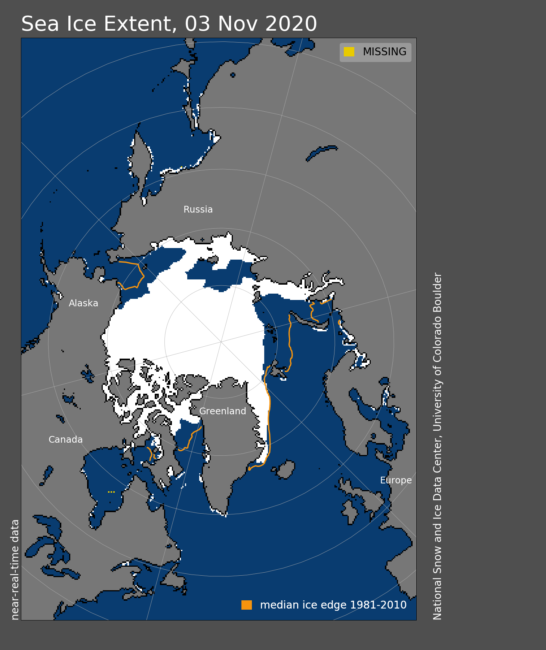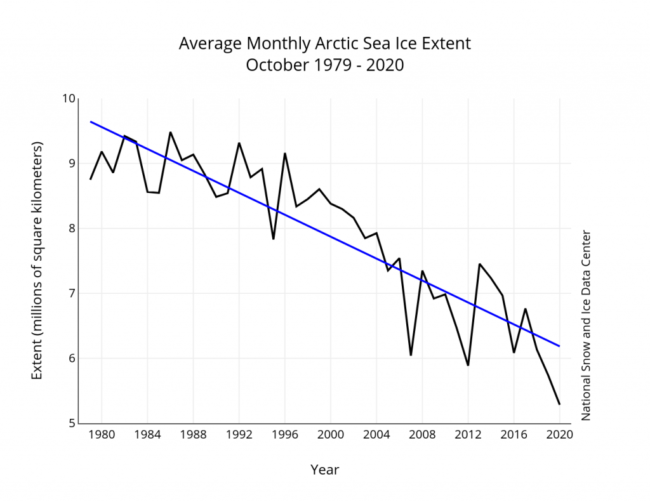
The National Snow and Ice Data Center have issued their monthly Arctic update. It is getting cold in the Arctic. Well yes, but it is not business as usual …
A vast area of the Arctic Ocean remains ice free as November begins, far later in the season than is typical. The monthly average ice extent for October is the lowest in the satellite record. On October 24, a record difference was set in daily ice extent relative to the 1981 to 2010 average. Large heat transfers from the open water to the atmosphere have manifested as above-average air temperatures near the surface of the ocean.
Details
Pictured above is the actual extent of the sea ice on Nov 3. To place that into context they also have a chart that illustrates the extent of the sea ice each and every October. This goes back to the start of satellite data collection in 1979. What is clear is that we are in a downward trend …

The linear rate of decline for October sea ice extent is 10.1 percent per decade.
To put that decline into a quantity that we can perhaps grasp, Over the 42-year satellite record, the Arctic has lost about 3.45 million square kilometers (1.33 million square miles) of ice in October. This is based on the difference in linear trend values in 2019 and 1979.
That is an area that is comparable to twice the size of the state of Alaska.
Why does this matter?
The election, as I write this, has been close, too close to call yet, but it will most probably be Biden.
Perhaps you are astonished that vast numbers voted for the idiot-in-chief, and against doing something about the climate.
Don’t be.
For those that think about things analytically, and deploy reason and evidence, the choice was clear – Biden. This is because we must take meaningful decisive action and he is the choice for that to happen. For our species, the option of business as usual and doing nothing is really not an option. Those that lean towards emotional thinking fell pray to blatant emotional manipulation. Fear of “Them” was a strong force in play, and so reason and facts simply went whooshing over many heads.
The idea of an ice free Arctic might not appear to be a big deal and of no consequence because it is far away and of no interest.
It does profoundly matter.
No ice means that the dark ocean is exposed. Ice reflects solar radiation back out into space, but a darker exposed ocean will absorb that energy. The existence of that ice plays a role in maintaining a comfortable temperature for life on the planet. Without it, more energy pours into the climate system and destabilises it.
The jet stream drives much of our climate. What drives it is the temperature difference between the Arctic and further south. When that temperature is not so pronounced, the jet stream develops kinks (it twists and turns). This leads to systems that creates droughts and also slows Hurricanes such that they move a lot more slowly and do far more damage.
In other words, a rapidly changing Arctic will not simply impact a few Polar Bears, it will disrupt the production of crops and lead to far greater storm impacts.
There is of course the obvious. In a warming world, sea level is also rising. There is enough frozen water to raise sea level by another 60-70 meters. All the familiar costal cities, London, Tokyo, New York, Boston, etc… will be gone.
So does it matter, is doing nothing an option?
Yes.
It is not too late, we really can still take decisive meaningful action.
